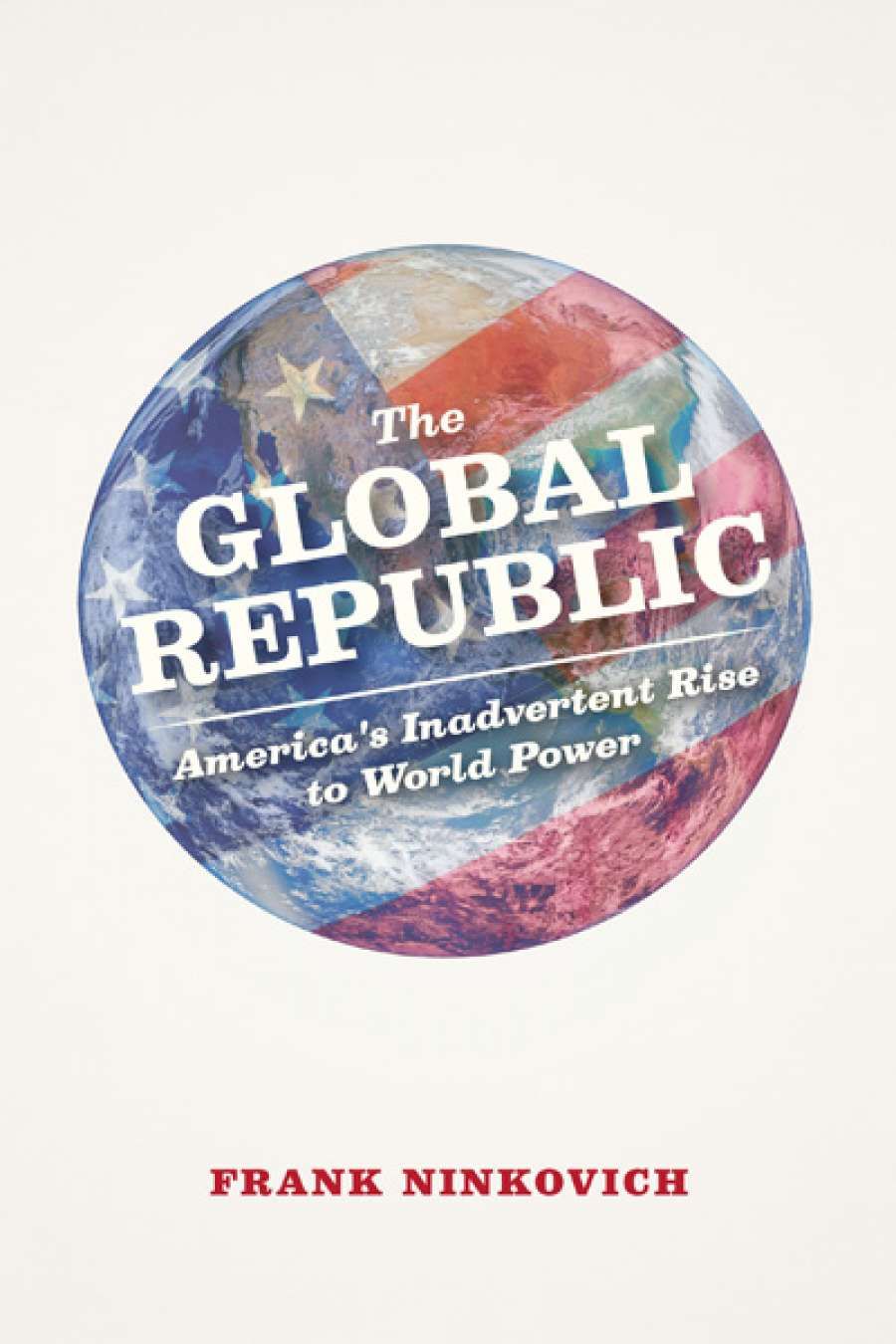
- Free Article: No
- Contents Category: Politics
- Custom Article Title: Glyn Davis reviews 'The Global Republic' by Frank Ninkovich
- Review Article: Yes
- Online Only: No
- Book 1 Title: The Global Republic
- Book 1 Subtitle: America's Inadvertent Rise to World Power
- Book 1 Biblio: University of Chicago Press (Footprint), $61 hb, 368 pp, 9780226164731
A nation founded as a democratic republic in an era of monarchies, with a founding document expressing the rights of every citizen, was unique in the eighteenth century. It would develop a distinctive foreign policy to mirror its circumstances: Manifest Destiny to claim an entire continent, and democratic values the nation was keen to share with the world. That world had never seen such a vast and richly endowed nation. This was a community that could welcome the huddled masses without replicating the feudalism or class structures of the Europe they fled. As the City upon a Hill, the United States would lead the world to peace, prosperity, and democracy.
‘Exceptionalism becomes a proxy for patriotism, a way of implying that Obama is not sufficiently American’
Yet for Frank Ninkovich – foreign policy expert, historian, and author of The Global Republic – the vision of American exceptionalism has distracted intellectuals from considering the actual character of American foreign policy. The Global Republic is his counter-narrative of the forces at work in creating a US outlook. The subtitle – ‘America’s Inadvertent Rise to World Power’ – expresses a view that neither divine providence nor an overarching mission explains the power and influence of the republic. Rather, suggests Ninkovich, the forces of globalisation have long been at work on the United States. They have shaped the American trajectory, carrying the United States into an unexpected, and not always welcome, global prominence.
This is a contrarian view. It suggests that the United States is not free of the entanglements of history and has no special responsibility to carry American values beyond its shores. Ninkovich has spent a lifetime meditating on US foreign policy. His work on the international thinking of Woodrow Wilson initiated an important controversy over whether the Wilsonian program for international cooperation reflected mainstream American thinking or was a personal mission that largely failed. Ninkovich believes that Wilson misread the prospects for international cooperation; his Big Idea, the League of Nations, proved a ‘historical cul-de-sac’. Instead, suggests Ninkovich, US foreign policy should be understood as a response to powerful forces at work inside the nation, in particular the consequence of a national commitment to markets and free trade.
The origins of US foreign policy, Ninkovich suggests, can be found in the exigencies of trade and the work of modernism. By the time of the Civil War, American leaders understood that national prosperity depended on engagement with global trends. International society became a necessary condition of domestic growth. Into the twentieth century, scale and wealth, along with historical developments such as the Cold War, carried the United States into the uncomfortable role of global leader, the only nation capable of sustaining the international ideal in the wake of disastrous conflict. It is not a permanent obligation; as global arrangements take hold, suggests Ninkovich, the United States can step back and benefit from the international order it helped create.
Yet the tone is not always optimistic. Ninkovich stresses ‘radical discontinuity’ in recent decades. A single shock, such as the attacks of 9/11, can overthrow the assumptions of apparently settled policy. When the United Nations declined to support an invasion of Iraq after 9/11, President George W. Bush dismissed the global body as little more than a talking shop and initiated a ‘new American unilateralism’. The slow return to international norms has been accompanied by huge losses of life and treasure. Future discontinuity may provoke further retreats.
‘the tone is not always optimistic. Ninkovich stresses ‘radical discontinuity’ in recent decades’
For, as Ninkovich acknowledges, logic and analysis are not the only influences on foreign policy. The United States might operate as a global republic most of the time, but the exceptionalism argument retains ‘tenacious staying power’, a sense that the United States can and should go it alone. Clearly such an aspiration speaks to Americans such as Louisiana Governor Bobby Jindal, born in the United States to Punjabi parents, an example of America’s extraordinary ability to assimilate immigrants and provide opportunity within a framework of American values. When Jindal criticises President Obama for insufficient commitment to exceptionalism, he claims America as an ideal beyond categories, the hope of the world still.
Yet Governor Jindal is also an example of the global forces explored by Ninkovich. Ideas, capital, and people move around the world. Jindal can play the Republican patriot when local politics require, but he is also a former Rhodes Scholar, political scientist, and McKinsey analyst. His journey tells of globalisation firsthand, in a nation that can absorb currents of thinking from many places, and organise them through universities and consulting companies. In quieter moments, the governor might ponder the subtle analysis of The Global Republic, as US foreign policy engages with global forces. It is a more credible reading of his nation, a reminder that America produces not just partisan squabbles but superb scholarship around issues that matter.


Comments powered by CComment